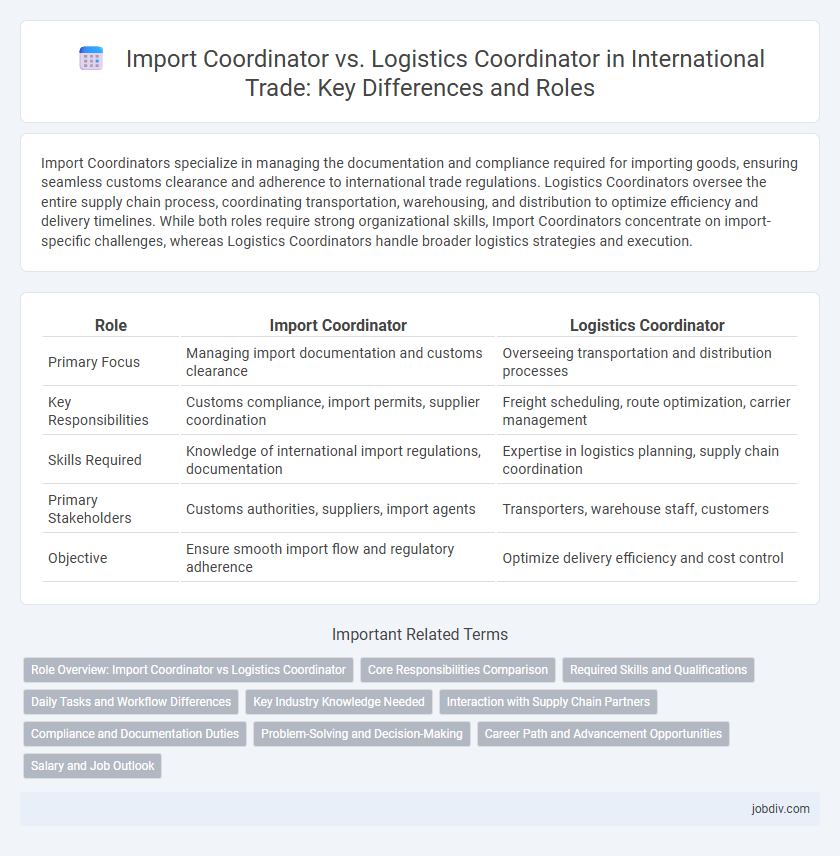Import Coordinators specialize in managing the documentation and compliance required for importing goods, ensuring seamless customs clearance and adherence to international trade regulations. Logistics Coordinators oversee the entire supply chain process, coordinating transportation, warehousing, and distribution to optimize efficiency and delivery timelines. While both roles require strong organizational skills, Import Coordinators concentrate on import-specific challenges, whereas Logistics Coordinators handle broader logistics strategies and execution.
Table of Comparison
| Role | Import Coordinator | Logistics Coordinator |
|---|---|---|
| Primary Focus | Managing import documentation and customs clearance | Overseeing transportation and distribution processes |
| Key Responsibilities | Customs compliance, import permits, supplier coordination | Freight scheduling, route optimization, carrier management |
| Skills Required | Knowledge of international import regulations, documentation | Expertise in logistics planning, supply chain coordination |
| Primary Stakeholders | Customs authorities, suppliers, import agents | Transporters, warehouse staff, customers |
| Objective | Ensure smooth import flow and regulatory adherence | Optimize delivery efficiency and cost control |
Role Overview: Import Coordinator vs Logistics Coordinator
An Import Coordinator manages the documentation, compliance, and customs clearance processes for incoming shipments, ensuring timely and cost-effective import operations. A Logistics Coordinator oversees the end-to-end supply chain activities, including transportation planning, inventory management, and distribution coordination to optimize delivery schedules. Both roles require strong communication skills and coordination across multiple stakeholders, but the Import Coordinator specializes in import regulations while the Logistics Coordinator focuses on overall supply chain logistics.
Core Responsibilities Comparison
Import Coordinators manage the end-to-end process of importing goods, including customs clearance, compliance with trade regulations, and coordination with suppliers and customs brokers. Logistics Coordinators focus on organizing and optimizing shipment routes, managing transportation schedules, and ensuring timely delivery of goods from origin to destination. Both roles require strong coordination skills, but Import Coordinators emphasize regulatory compliance, while Logistics Coordinators concentrate on transportation and distribution efficiency.
Required Skills and Qualifications
Import Coordinators require expertise in customs regulations, international trade compliance, and proficiency in documentation management to ensure seamless import processes. Logistics Coordinators must demonstrate strong skills in supply chain management, transportation planning, and inventory control to optimize the movement and storage of goods. Both roles demand effective communication, problem-solving abilities, and proficiency with logistics software, but Import Coordinators focus more on regulatory knowledge while Logistics Coordinators emphasize operational efficiency.
Daily Tasks and Workflow Differences
Import Coordinators primarily manage customs documentation, coordinate with suppliers and freight forwarders, and ensure compliance with import regulations to facilitate smooth international shipments. Logistics Coordinators focus on planning and tracking the movement of goods within the supply chain, optimizing transportation routes, and managing warehouse operations. While Import Coordinators handle paperwork and regulatory tasks, Logistics Coordinators emphasize the physical flow of goods and inventory control.
Key Industry Knowledge Needed
Import Coordinators require deep knowledge of international trade regulations, customs clearance procedures, and import documentation to ensure compliance and timely delivery. Logistics Coordinators must understand supply chain management, transportation modes, and warehouse operations to optimize product flow and reduce costs. Both roles demand expertise in inventory control systems and coordination with carriers, but Import Coordinators focus more on cross-border compliance while Logistics Coordinators emphasize route planning and distribution efficiency.
Interaction with Supply Chain Partners
An Import Coordinator manages communication and documentation with customs brokers, suppliers, and freight forwarders to ensure timely clearance and compliance, facilitating smooth procurement processes. A Logistics Coordinator interacts closely with carriers, warehouses, and distribution centers to optimize shipping schedules, inventory management, and delivery accuracy. Both roles collaborate with supply chain partners to streamline operations, but the Import Coordinator focuses more on cross-border regulations while the Logistics Coordinator emphasizes domestic transportation efficiency.
Compliance and Documentation Duties
Import Coordinators specialize in ensuring all international shipments comply with customs regulations, manage import licenses, and prepare detailed documentation such as commercial invoices and bills of lading. Logistics Coordinators focus on the overall movement and storage of goods within the supply chain, coordinating transportation schedules and maintaining shipping records to facilitate timely delivery. Both roles require meticulous attention to regulatory compliance, but Import Coordinators prioritize customs clearance and import-specific documentation, while Logistics Coordinators handle broader shipment tracking and coordination tasks.
Problem-Solving and Decision-Making
Import Coordinators specialize in resolving customs clearance issues and managing compliance with international trade regulations, ensuring smooth entry of goods into the country. Logistics Coordinators focus on optimizing transportation routes and addressing supply chain disruptions to maintain efficient delivery schedules. Effective decision-making for Import Coordinators involves regulatory adherence and documentation accuracy, while Logistics Coordinators prioritize operational efficiency and cost control.
Career Path and Advancement Opportunities
Import Coordinators specialize in managing the inbound shipment processes, ensuring compliance with customs regulations, and coordinating with vendors and customs brokers to streamline cargo movement. Logistics Coordinators oversee broader supply chain functions, including inventory management, transportation planning, and warehouse operations, offering a wider scope for career growth into supply chain management roles. Advancement for Import Coordinators typically leads to roles such as Import Manager or Customs Compliance Specialist, while Logistics Coordinators can progress to positions like Logistics Manager, Supply Chain Analyst, or Operations Director.
Salary and Job Outlook
Import Coordinators typically earn an average salary ranging from $45,000 to $65,000 annually, reflecting their specialization in managing customs clearance and compliance processes. Logistics Coordinators command a slightly broader salary range of $40,000 to $70,000, due to their role encompassing supply chain management, transportation scheduling, and inventory oversight. The job outlook for Import Coordinators is growing steadily at about 5% through 2030, driven by increasing global trade complexities, while Logistics Coordinators are expected to see a higher growth rate of approximately 7%, fueled by expanding e-commerce and distribution network demands.
Import Coordinator vs Logistics Coordinator Infographic

 jobdiv.com
jobdiv.com